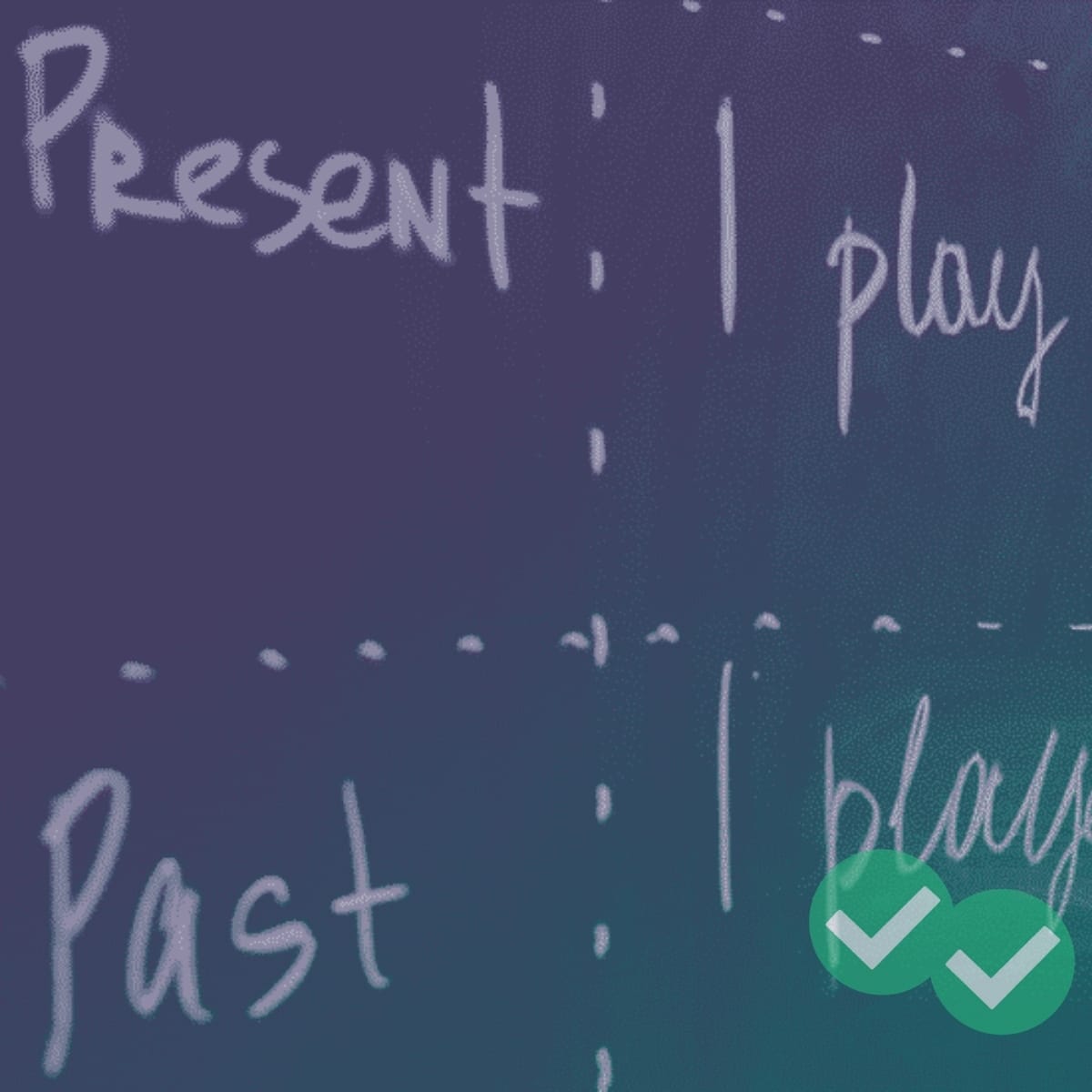
When it comes to English grammar, verb tenses describe at what point in time an action is taking place. There are three English verb tenses:
- The present tense describes things that are happening right now or things happening continuously.
- The past tense describes things that have already happened.
- The future tense describes things that have not happened yet.
The tenses are categorized into four different forms.
- The simple form
- The perfect form
- The continuous form
- The perfect continuous form
In the tables below, we break down their usage in the affirmative, negative and question formats. You can also click on each verb tense (ex. Present Simple, Past Perfect) to go to a more detailed post about its usage and examples.
Be sure to bookmark this page, so you can easily click back when you need a reminder.
KEY
V → Root Verb
V2 → the second form (Past Simple) of an irregular verb
V3 → the third form (Past Participle) of an irregular verb
Ved → Past form for regular verbs
Ving → Present Participle
Vs/Ves → Present Simple form for most verbs (goes)
**The following tables illustrate the English verb tenses for the verb ‘work’ in every form.**
Simple Verb Tenses Table
| Simple Tenses | Present Simple | Past Simple | Future Simple |
| + | V/Vs/Ves
I work every day. |
Ved/V2
Last night, I worked. |
Will + V
I will work tomorrow. |
| ? | Do/Does + subject + V
Do you work every day? |
Did + subject + V
Did you work last night? |
Will + subject + V
Will you work tomorrow? |
| – | Do/Does + not + V
I don’t work every day. |
Didn’t + V
Last night, I didn’t work. |
Won’t + V
I won’t work tomorrow. |
| Typical time indicators | Every day, usually, … | Yesterday, last [night, week], … | Tomorrow, next [month, week], … |
Perfect Verb Tenses Table
| Perfect Tenses | Present Perfect | Past Perfect | Future Perfect |
| + | Have/Has + Ved/V3
I have worked a lot today. |
Had + Ved/V3
I had worked for 10 hours. |
Will + have + Ved/V3
I will have worked 80 hours by next Tuesday. |
| ? | Have/Has + subject + Ved/V3
Have you worked a lot? |
Had + subject + Ved/V3
Had you worked 10 hours? |
Will + subject + have + Ved/V3
Will you have worked 80 hours by next Tuesday? |
| – | Have/Has + not + V3
I have not worked a lot yet. |
Had + not + Ved/V3
I had not worked 10 hours. |
Will + not + have + Ved/V3
I will not have worked 80 hours by next Tuesday. |
| Typical time indicators | Since 1988, today, for three hours, yet, recently… | For three hours, by the time [something happened] | For three hours, by the time [something will happen] |
Continuous Verb Tenses Table
| Continuous Tenses | Present Continuous | Past Continuous | Future Continuous |
| + | To be [am, is, are] + Ving
I am working today. |
(Past) To be [was/were] + Ving
I was working last week. |
Will + be + Ving
I will be working tomorrow. |
| ? | To be [am, is, are] + subject + Ving
Are you working today? |
(Past) To be [was/were] + subject + Ving
Were you working last week? |
Will + subject + be + Ving
Will you be working tomorrow? |
| – | To be [am, is, are] + not + Ving
I am not working today. |
(Past) To be [was/were] + not + Ving
I was not working last week. |
Will + not + be + Ving
I will not be working tomorrow. |
| Typical time indicators | Now, at the moment, today | Yesterday, Last [night, week], … | Tomorrow, Next [month, week], … |
Perfect Continuous Verb Tenses Table
| Perfect Continuous Tenses | Present Perfect Continuous | Past Perfect Continuous | Future Perfect Continuous |
| + | Has/have + been + Ving
I have been working today. |
Had + been + Ving
I had been working for three hours when they called about the event. |
Will + have + been + Ving
I will have been working for 20 years this July. |
| ? | Has/have + subject + been + Ving
Have you been working for three hours? |
Had + subject + been + Ving
Had you been working for three hours when they called? |
Will + subject +have + been + Ving
Will you have been working for 20 years in July? |
| – | Has/have + not + been + Ving
I have not been working. |
Had + not + been + Ving
I had not been working for very long when they called. |
Will + not + have + been + Ving
They will not have been working for very long. |
| Typical time indicators | Since 1988, today, yet, for three hours, recently… | For three hours, by the time [something happened] | For three hours, by the time [something will happen] |
Be sure to keep this article saved so you can refresh your memory about the various verb tenses used in English anytime!


Leave a Reply